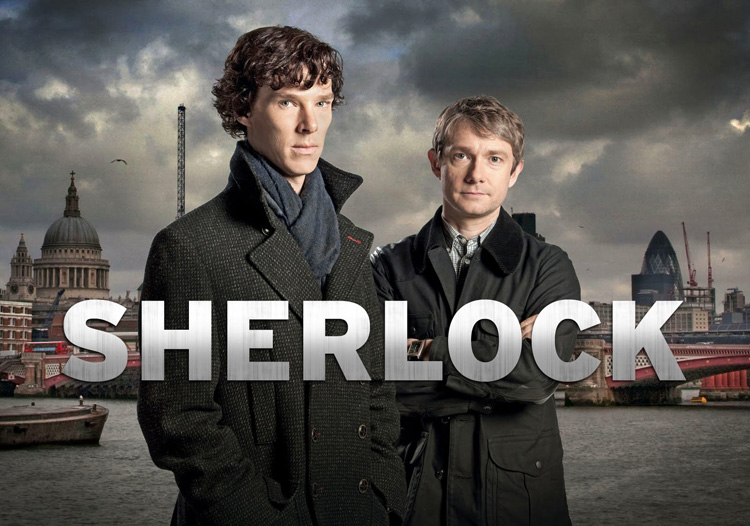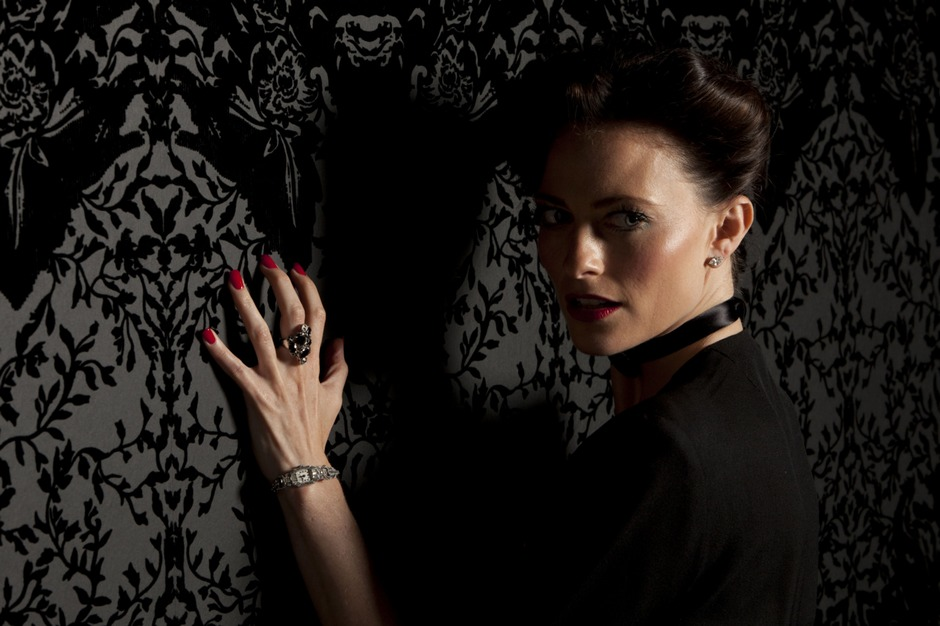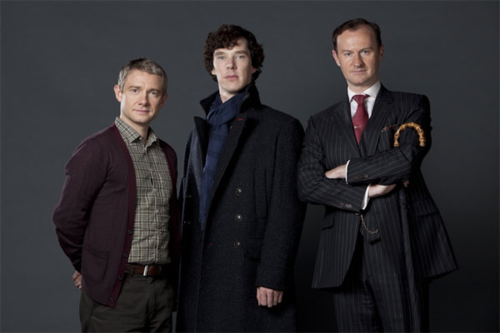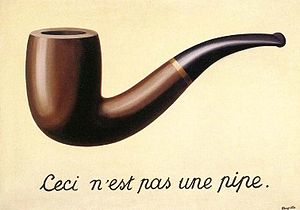The Ambiguously Gay Duo of Sherlock: Sexual Aesthetics and the Limits of Cinematic Language
Camille DeBose / DePaul University

Season two of BBC America’s series Sherlock opens with a bomb, snipers, Moriarty’s awkward falsetto and a BeeGees ringtone. The cinematography is lovely and engaging. Watson and Sherlock are pulled from their efforts to solve the mysterious demise of an outdoorsman when representatives of Buckingham snap up the duo who soon find themselves sitting in the palace (Sherlock sans clothing). It is during this meeting with his brother Mycroft that we are introduced to not just the plot of episode one but also the subplot which will run, thickly, through each episode of the series. There is a well-known dominatrix referred to as The Woman who is in possession of compromising photos1. This is the plot. During the meeting this exchange occurs between the brothers.
Sherlock: “Dominatrix?”
Mycroft: “Don’t be alarmed, it’s to do with sex.”
Sherlock: “Sex doesn’t alarm me.”
Mycroft: “How would you know?”

This exchange is odd but not necessarily out of place in the manner in which Sherlock and Mycroft routinely trade barbs. As the show progressed I realized the question of Sherlock’s sexuality is the dominant (if not only) subplot. The viewer wants to know, as do almost the entire cast of characters, what Sherlock “is.” What follows this initial scene is a series of fascinating performances and exchanges that require everyone to “come out” as something. Everyone except Sherlock. Stranger still is the way in which his consistent adherence to asexuality becomes “read” or “told” as ambiguously gay which, for me, begs a discussion of the current limitations of cinematic language. Much of this homo-ambiguity is asserted through the relationship between Sherlock and Watson.
The Woman: “Somebody loves you. If I had to punch that face I’d avoid your eyes and nose too.” (Referring to Watson)
Watson’s Ex-Girlfriend: “My friends were wrong about you. You’re a great boyfriend. Sherlock Holmes is a very lucky man.”
To counter these assertions Watson is constantly declaring that he is “not gay.” I don’t mean to suggest the series is in any way homophobic because I don’t find it so. I find it strangely declarative. Watson is regularly declaring he’s not gay. Later a male couple in the “Hound of Baskerville” declare they are. The Woman in a pivotal scene declares she is lesbian. Everybody’s coming out (in word or deed) when the question being posed is “What is Sherlock?” The “problem” of Sherlock’s asexuality presents us with an interesting opportunity to slice into the signs and symbols of cinematic language and assess whether it has become overburdened with sexual signifiers. We can then go further and interrogate whether this load works to restrict how we “show” a story. The absence of sexual situations in Sherlock withholds from its viewers the answer to the question- “what is he?” Well… He is a “virgin” who “is not afraid of sex” and friend to Watson who is emphatically “not gay!” I was tremendously amused recently when my eleven year old declared he’d deciphered the adult conversation between me and my husband by using “context clues.” Sherlock offers no contexualizing morsels which makes me wonder if we (producers of visual media) do not yet know how to “show” asexuality. In his asexuality he becomes gay. Sort of. Sherlock is aggressive. Well dressed and dapper though he may be he is also prone to fits of rage. During one scene in the Hound of Baskerville, Watson refers to Holmes as “Spock” but he is not “Spock.” Sherlock is sincerely emotive and quite passionate. While he is not a sexual creature he is certainly an emotional one2. In Kim et al’s discussion of the “Heterosexual script” they assert the existence of, what they identify as, a “sex as masculinity” code which “positions sexuality as a defining component of masculinity and encompasses notions that men are sexual initiators who are preoccupied with sex and…will go to great lengths to have intercourse.”3 Sherlock decouples masculinity from sex through displays of aggression and dominance while simultaneously creating ambiguity by his sexual disinterest.
We are offered The Woman as a red herring when it is revealed that naughty Sherlock did in fact, during their introduction, peek at her naked body long enough to memorize her measurements (which **spoiler alert** later prove to be the combination to her safe). But what does it mean that his mind observed and calculated the measurements of her body just as his mind observes and calculates everything else. Nothing? Something? She was naked! It must mean something! Maybe it means nothing.
Watson: “We’re not a couple.”
The Woman: “Yes you are.”

Sherlock is the asexual in a hypersexual world. He is desired, in some way, by everyone. Throughout episode one his phone moans its alert each time he receives a text message. All of the characters (Mrs. Hudson most hilariously) but Sherlock respond to the connotative meaning of the sound. In one scene The Woman inquires:
The Woman: “Have you had anyone?”
She sinks to the floor on her knees before him. Later she will reveal that Moriarty has christened the brothers The Iceman (Mycroft) and The Virgin (Sherlock). In the same episode Watson inquires:
Watson: “…has he ever had any kind of girlfriend, boyfriend, anything?”
Watson undertakes most of the emotional labor in the series patiently caring for, literally and figuratively, Sherlock. This makes the anxious assertions by Watson of “not gay!” troubling on their face, but doubly so if they are meant as a humorous release valve designed to comfort the disquiet of the viewer who so desperately wants to know “What… is… Sherlock?” Has visual language become so hetero or homo- descriptive that we are left unable to visibly render any other expression of sexuality and as such we must make anxious assertion in the dialogue to “tell” what we can’t “show?” I must confess after writing this piece I find myself disappointed in a series of which I am most assuredly fond. A subplot centered on Sherlock’s sexuality which serves no greater purpose but to exist as a punch line seems too low for this beautifully constructed show. It seems undeserving of this excellent cinematic shell.
Or.
In a sociocultural era where many viewers demand all “good” protagonists possess a love interest the writers have delivered just that while simultaneously assuring the rest of us that this protagonist never will. In the story universe of Sherlock Holmes they are all and none his lovers and that, perhaps, reveals the show’s brilliance in spite of the current restrictions on visual language.

At the end of the day there will be some viewers out there who just want Sherlock to pick a side. Kiss the girl. Grope Watson. Something! By “showing” them he is gay or straight he will “tell” them how to feel about him. To those wanting viewers I can only offer this: Ceci n’est pas une pipe.
Image Credits:
1. Sherlock and Watson
2. The Woman
3. Sherlock, Watson, and Mycroft
4. Magritte’s “The Treachery of Images”
Please feel free to comment.
- It is made clear the photos are problematic due to their sexual nature. However, we are also informed the photos are of a young “female” person, as if this adds another layer of urgency to their recovery. [↩]
- In Chasin’s review of the literature Bogaert “…argued specifically that lacking sexual attraction, even according to Storms’ model, does not entail also lacking romantic or affectional attraction.” (Chasin, CJ DeLuzio, “Theoretical Issues in the Study of Asexuality,” Archives of Sexual Behavior (2011) 40: 713–723). [↩]
- Kim, Sorsoli, Collins, Zylbergold, Schooler, and Toman, “From Sex to Sexuality: Exposing the Heterosexual Script on Primetime Network Television,” Journal of Sex Research
2007, Vol, 44, No, 2, 145-157. [↩]
Surely the nature of Sherlock’s emotional conflict throughout the series is defined by his difficulty with exposing himself to the vulnerability of any kind of intimacy. Close contact of any kind versus personal isolation seems to be the question of the subplot, rather than specifically homosexual or heterosexual interest or relations. Will he remain an island, unable to really open himself to human connection, or will he engage with man or woman or both? He is perhaps being presented with every kind of emotional and sexual temptation, to test the bounds of his willful isolation. The variation of the opportunities he encounters, with different kinds of men and women, makes the choice to pull away and isolate himself that much more extreme.
I think one of Sherlock‘s most admirable qualities is the way in which it addresses sexuality. British television productions have always been incredibly more progressive and accepting when it comes to homosexuality compared to their American counterparts. BBC and other British networks have a reputation for authentically depicting real people. Sherlock often nonchalantly includes jokes and comments in regard to sexuality, none of them accompanied by a negative connotation.
However, because homosexuality is such a stigma in the U.S right now, I think American audiences are eager to label characters and their actions by reducing them to stereotypes in order to make better sense of them. But as in real life, sexuality means very little to the merit of these characters. Sherlock and Watson are universally like and considered, for the most part, good people; Their sexual orientation and expression of that sexuality plays no role in this perception.
You bring up some interesting points. Since your article a new season of Sherlock has aired and with it, new material for your study of the show. (SPOILERS!) In season 3 of the show, it seemed like that question (or part of it, at least) had been answered. In the third episode (“His Last Vow”), we learn that Sherlock now has a girlfriend, Janine (Mary Watson’s bridesmaid in “The Sign of Three”). In a flurry, we feel satisfaction in knowing, as you said, “…what Sherlock ‘is.’” We also notice John’s reaction which seems like a mix of amusement, bewilderment, and a pang of jealousy. He seems jealous, not of their sexual relationship, but of the intimacy that type of relationship entails. For the last two seasons and the first part of the third, he has struggled to get Sherlock to open up in a way that he seems to have opened up to Janine. Later in the episode we find out that it was all a rouse. Sherlock was only with Janine in order to gain access to her boss’ apartment.
Aside from the intentional sexual tension created between John and Watson, I find their relationship extremely interesting and I believe it to be the main subplot in the show. The character of Sherlock Holmes throughout history can be seen as an archetypal outlaw hero. A character who follows his own moral code and lacks any substantial ties with either family, friends, or romantic partner. Which is why I find the John/Sherlock relationship so intriguing. Outlaw heroes are often either asexualized or made into womanizers. In the show, Sherlock’s asexuality translates into bisexuality at times and confusion at others. It seems like not even Sherlock has figured out exactly who or what he is. The only thing he seems to understand is that he cares deeply for John but because he is an outlaw hero, he is constantly pushing John out of his live because he believes John would be better off without him.
I believe it is very astute to say that we live in a hypersexual world. A world focused so much on the sexuality of even fictitious characters on television, a world obsessed with labels. Categorizing and fitting people into little molds is what helps society form opinions and judgments on things. This is in no way a moral way to view things, but that is the society we live in. That’s why when looking at a show like Sherlock where the main character must have a specific label when it comes to sexuality is no surprise, but I believe it is the society we live in that is creating the issue rather than the content itself. That’s not to say that the content doesn’t present some problematic and unprogressive ideas as far as sexuality but rather that it reflects society’s views.
Let me begin with John Watson’s defensive reaction to being called “gay” by many characters in the show. It’s not problematic that the issue is brought up, and in fact it provides a form of comedy throughout the show. He is obviously a foil to Sherlock and they form a very close relationship. Society however, hyper sexualizes their relationship. Male intimacy versus female intimacy in terms of a platonic relationship is viewed so differently especially when it comes to a male audience. Men can’t have an intimate, platonic relationship without being accused of being homosexuals. I also speculate that the reason homosexuality in terms of the main characters is brought up so often is because the audience wants the confirmation that they aren’t. Sex sells and for a prominently straight, female audience, they want their main “product” to sell. Fantasizing about the main characters is something that makes this show popular and successful which is evident by Benedict Cumberbatch’s recent uprising as a modern day “heart throb”.
I think the most problematic thing when it comes to this show isn’t the homosexual innuendos, but the fact that it had a chance to do something progressive and new but in the end gave in to societal norms. Straight, gay, lesbian: although there is little visibility on television for these some of these communities as time is evolving they are being represented more and more, but when it comes to asexual community there is no representation on television.
The only other time an asexual being has been given visibility is with Sheldon Cooper on CBS’ The Big Bang Theory but just like Sherlock it gave into societal norms and developed a love interest for Sheldon. I will say that the one thing that Sherlock does very well is Sherlock’s own stance on his sexuality. He’s not scared or hurt by people’s accusations, he just doesn’t care what people think or say. In a world where sexuality is such a publicly sensitive subject it’s refreshing to see someone that doesn’t care if society will accept him or not.
Sherlock has a superior mind, incredibly rational, like a human calculator. But I think that his mind is also very open to the world known and unknown: he trusts only of his senses, but if his senses tell something new, something unknown, he change his life prospective. Do you remember the scene in The Hound Of Baskerville when, for a bit, Sherlock considered the existence of a supernatural creature?
I just want to say that he is too superior to be only homosexual or eterosexual: I think he is both. But in a rational way: of course he is a human being and he has sexual needs (I don’t think he is asexual), but unlikely he will be in a real and traditional relationship. He just can’t. I see him like the Nietzsche’s Übermensch (Super man/superior man).
I’m so sorry for my bad English but I’m italian and for me is very difficult to explain a topic like this. If we were talking Italian I could explain my reasons much better!